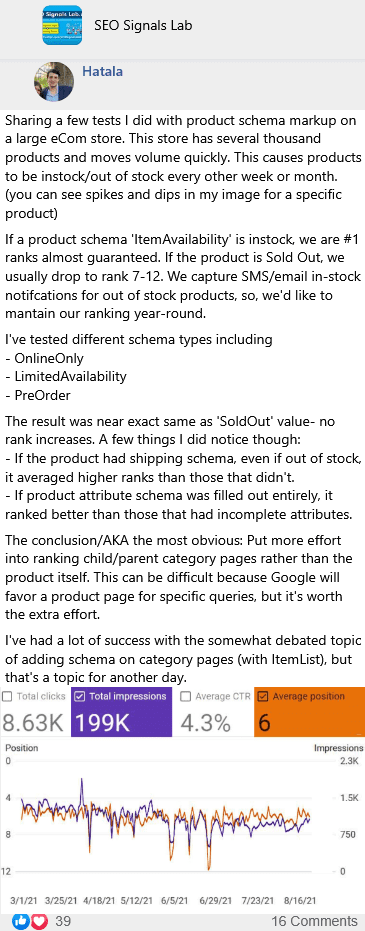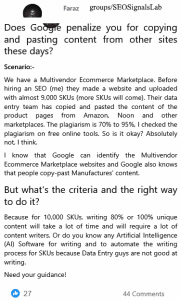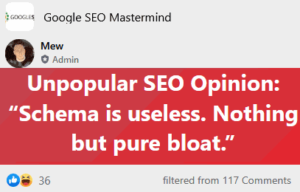Hatala
Sharing a few tests I did with product schema markup on a large eCom store. This store has several thousand products and moves volume quickly. This causes products to be instock/out of stock every other week or month. (you can see spikes and dips in my image for a specific product)
If a product schema 'ItemAvailability' is instock, we are #1 ranks almost guaranteed. If the product is Sold Out, we usually drop to rank 7-12. We capture SMS/email in-stock notifcations for out of stock products, so, we'd like to mantain our ranking year-round.
I've tested different schema types including
– OnlineOnly
– LimitedAvailability
– PreOrder
The result was near exact same as 'SoldOut' value- no rank increases. A few things I did notice though:
– If the product had shipping schema, even if out of stock, it averaged higher ranks than those that didn't.
– If product attribute schema was filled out entirely, it ranked better than those that had incomplete attributes.
The conclusion/AKA the most obvious: Put more effort into ranking child/parent category pages rather than the product itself. This can be difficult because Google will favor a product page for specific queries, but it's worth the extra effort.
I've had a lot of success with the somewhat debated topic of adding schema on category pages (with ItemList), but that's a topic for another day.
📰👈
16 Comments
Good sound findings and good advice.
I like itemList schema – though I don't always apply it unless the budget allows. It helps, but Google is pretty good at picking up the context from the downlinked product pages and realizing what's going on with the archive page even without it. If there are a few bucks and a block of time in the budget for me to set up the products->itemList stuff, I'll do it.
I have to admit, that I haven't considered optimizing category pages for stock levels – but it makes a bit of sense. My main reason for optimizing them is for ambiguity or broadness of search terms. Product pages are going to rank if Google is certain that the person is looking for that specific product. Category, Attribute cluster, and pages like that are great for the more broad terms.
For example, you may sell pet houses. Dog Houses, Cat Houses, Bird Houses, etc. And you might classify them with attributes as to whether they are made from Wood, Vinyl, Steel, or whatever. If someone is looking for a specific Dog House – they'll hit the product. If they are searching for dog houses, they'll get the category. But someone may also search for "wooden dog houses" or "wooden pet houses" and you want the system to be able to generate the appropriate page and product list that matches that criteria.
So, typically that's my main motivation for optimizing those types of organizational archive pages. I do like the "Out of Stock Fallback" concept, too. It makes sense. That page shouldn't rank quite as high as an in-stock exact match for a product search, but it's a nice fallback. If there aren't a ton of things in-stock on other sites, it's logical that Google might say, "Well, they sometimes have that, but maybe one of these similar ones that are in stock will do."
And I also generally agree that sometimes folks put a bit too much energy into the idea of optimizing product pages themselves. If you've got the foundation in there (schema, good descriptions, nice attribute lists, etc) then products are pretty much self optimizing. They are what they are and they have the features that they have. What more can you really do?
Well put. Thanks for your additional insight. Like you said, it really depends on a case by case basis. This particular store (and 2 others) are high volume with a hundred parent categories and a thousand child cats. We optimize the parent categories that 1- contain products with lots of organic volume and 2- contain products that usually go in and out of stock.
Also, managing schema on a large website is definitely frustrating, no matter the Content Management System (cms). But Google Tag Manager is an absolute life saver with that
Ankit
For product category pages, which schema do you use?
Product Group or ItemList?
And how do you add/manage schema? Manually? Or plugin?
Itemlist. I've never tried productgroup- would be interested to hear from those that had.
Also, the best way to manage schema, hands down: Google tag manager
Ankit
Hatala wow, it never occurred to me to use tag manager. Do you have a guide/article (recommended) about using tag manager for schema implementation and management?
Hatala » Ankit
Maybe I should write something specifically for ecom schema. However there's a lot of changes going on currently with the way Google is handling schema and Google Tag Manager (GTM) major changes.
But Check out Simo Ahava (I don't think he's in this group, but he should be!) tutorials. He's the best in the industry.
https://www.simoahava.com/analytics/enrich-SERP-results-using-gtm/Enrich SERP Results Using GTM
📰👈
An SEO Opinion: Schema Is Useless; Nothing; Pure Bloat
The Most Prominent Ranking Factor for E-Commerce
Google Tag Manager (GTM) Allows You to Manage and Deploy Marketing and Tracking Tags on Your Website Without the Need to Modify the Code on Your Website







